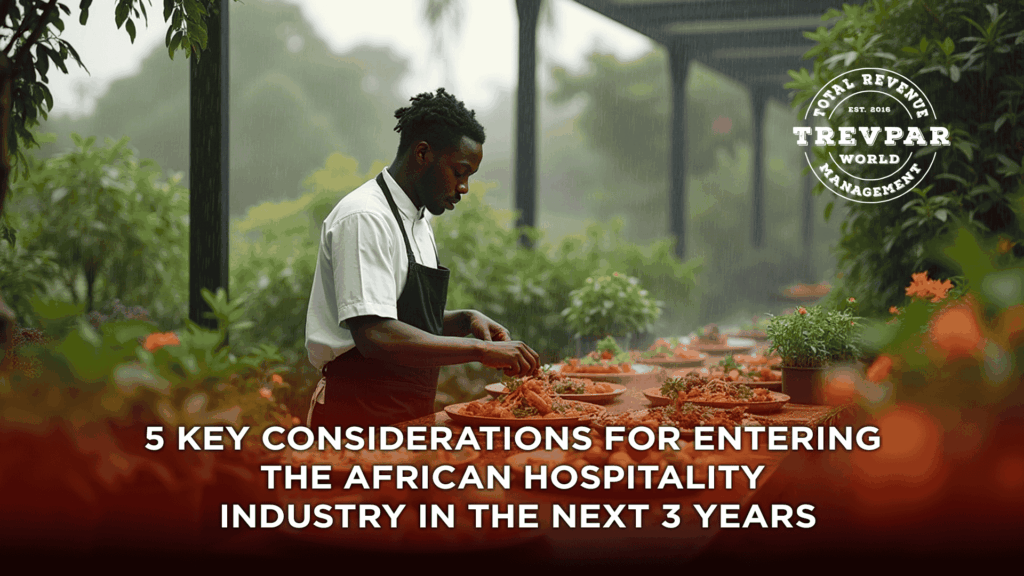The African hospitality industry, spanning hotels, tourism, restaurants and related services, has been growing steadily through 2028, with revenues expected to reach USD 30 billion at a 5% annual growth rate. Hotel revenue alone is expected to increase from US$112.9 billion in 2025 to US$15 billion by 2029. This reflects a CAGR of 7.35% driven by an increase in unique attractions such as international arrivals, infrastructure development, wildlife safari and cultural heritage. As of mid-2025, the sector has recovered from the effects of the pandemic, but newcomers will need to address continental challenges such as infrastructure gaps, political instability and uneven digital access. With this year's 13.3% surge in hotel development projects and hotspots like South Africa forecast market growth to US$1.42 billion, the opportunity for innovative operators is ripe. However, success depends on about five key factors that have been tailored to the diverse landscapes of Africa over the next three years.
Dealing with labor shortages and labor development
Labor shortages plague Africa's hospitality, exacerbated by high unemployment among young people, skills gaps and occupational stigma. In South Africa, 65% of service workers face turnover due to long and low wages, but the lack of skilled roles and management across the continent hampers the growth of high NEET rates (1 in 5 of African youths who are not employed, educated or trained).
Participants should prioritize workforce strategies, including competitive wages, flexible schedules, and training programs tailored to local contexts, including partnering with national occupational institutions such as Kenya and Nigeria. AI in talent matching and community employment can strengthen retention and reduce sales of 70-80% seen in some segments. It is important to promote an inclusive culture and address wage issues over the next three years. This is important as the engagement team improves the quality of service with 21% in a guest-centric industry. Without robust planning, remote and urban operations risk disruption.
Adopting technology and digital innovation
While the adoption of technology is accelerating with Africa's hospitality, uneven infrastructure and digital divisions pose unique hurdles. By 2025, approximately 40% of African hotels are expected to integrate advanced solutions such as AI-driven personalization and mobile check-in to enhance efficiency and guest experience. In South Africa, hotel software for seamless booking and operation is redefineing the sector, but across the continent, intelligent virtual assistants (IVAs) and chatbots are deployed to improve guest interactions amid increasing smartphone penetration.
New entrants can invest in scalable technologies, especially in technology-savvy markets such as Kenya and Nigeria. Challenges include high implementation costs, cybersecurity threats, and the need for staff training in regions with limited technical literacy. Over the next three years, a high-tech smart, practical approach will be essential. This is because failing to adapt could potentially give market share to global chains in sectors where digital transformation to attract millennials and generations of travelers is key.
Prioritizing sustainability and environmentally friendly practices
Sustainability is the foundation of Africa's hospitality, leveraging the continent's rich biodiversity while addressing environmental vulnerabilities such as climate change and resource scarcity. Global Sustainable Tourism Council (GSTC) accreditations are increasingly being adopted, and hotels will attract green tourists with a focus on energy efficiency, waste reduction and community engagement. In South Africa, major facilities implement water conservation (27.5% adoption) and green wastewater management (15%), and across Africa, practices such as local procurement and reduction are standard in eco-lodges and safari camps.
New players need to embed sustainability from the start to appeal to travelers seeking authentic, low-collision experiences, complying with authentic regulations through sustainable architectural design rooted in local concepts such as “Ajaala” (nurturing environments and people). This could potentially reduce costs (e.g. via renewable energy), but requires advance investments and supply chain partnerships in areas that have challenged logistically.
Adapt to evolving consumer preferences
Tourism preferences in Africa have shifted towards cultural immersion, conservation-focused experiences, and “courage” (adventure trips). In South Africa, travelers prioritize personalized bookings via the app, but continental mouse (meetings, incentives, meetings, exhibitions) tourism and heritage holidays gain traction amid growth of 3-5% of international arrivals.
New businesses will need to use data analytics for tailored products, such as QR coded cultural tours and wellness retreats, but they will need to ensure privacy in the DataScars region. The challenges include differentiating in a diverse market, from historic locations in North Africa to East African wildlife. By adjusting these trends, operators can develop loyalty. 81% of consumers rely on reviews, driving repeated visits in the recovery sector.
Managing economic pressures and rising costs
Economic volatility, including inflation, political instability and supply chain issues, will challenge hospitality in Africa until 2028, with hotel projects funding continuing to be an important barrier due to high interest rates and risk recognition. Increases in operating costs standardized by energy prices and geopolitical conflicts provide increased revenue, but impacts profitability.
Strategies for participants include monitoring events in unstable regions such as parts of West Africa, while diversifying revenue (via coworking in urban hotels) and employing cost-effective technologies. Value-based pricing and partnerships with local suppliers reduce risk and reach $1.6 trillion worldwide forecasts such as tourism revenue, with Africa gaining share through reforms of nine major countries. A resilience plan is essential to thriving amid these pressures.
In conclusion, participating in the hospitality industry in Africa over the next three years promises great rewards in growing markets, but it requires adaptation to local realities. By leveraging technology, advocating for sustainability, building strong teams, responding to consumer change, and navigating economic hurdles, new ventures can leverage the continent's unique appeal and drive inclusive growth. Agility and cultural sensitivity define the leaders of this vibrant, evolving sector.
For industry-related news, click here.


